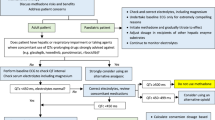Abstract
Sedation may be a doselimiting side-effect of opioid therapy in some cancer patients. This study was designed to evaluate further the use of the psychostimulant, methylphenidate, an agent that has been reported to counteract opioid-induced sedation, in patients with cancer-related pain. Patients receiving a stable dose of an opioid for cancer-related pain were recruited for this randomized, double-blind, crossover clinical trial. In addition to their regular dose of narcotics, they received 5 days of methylphenidate followed by 5 days of placebo, or vice versa. Our data did not definitively demonstrate any statistically significant benefit for methylphenidate, but did suggest that this drug could mildly decrease narcotic-induced drowsiness and could increase night-time sleep. These data, in conjunction with other published data, suggest that methylphenidate can counteract narcotic-induced daytime sedation to a limited degree.
Similar content being viewed by others
References
Ahwal M, MacEachern T, Schaeller T, Hanson J, Bruera E (1992) The effects of methylphenidate (MP) on narcotic-induced cognitive failure. Proc ASCO 11:397
Bruera E, Chadwick S, Brenneis C, Hanson J, MacDonald R (1987) Methylphenidate associated with narcotics for the treatment of cancer pain. Cancer Treat Rep 71:67–70
Bruera E, Fainsinger R, MacEachern T Hanson J (1992) The use of methylphenidate (MP) in patients (PTS) with incident cancer pain receiving opiates. Proc ASCO 11:380
Cohen J (1988) The t test for means. In: Cohen J (ed) Statistical power analysis for the behavioral sciences, 2nd edn. Lawrence Erlbaum Associates, Hillsdale, NJ, pp 19–74
Daut R, Cleeland C (1982) The prevelance and severity of pain in cancer. Cancer 50:1913–1918
Dodson ME, Fryer JM (1980) Postoperative effects of methylphenidate. Br J Anaesth 52:1265–1270
Foley K (1985) The treatment of cancer pain. N Engl J Med 313:84–93
Inturrisis C (1984) Role of opioid analgesics. Am J Med 77:27–37
Author information
Authors and Affiliations
Additional information
Additional participating institutions include: Ochsner Community Clinical Oncology Program, New Orleans, LA 70121, USA (Carl G. Kardinal, M.D.) Rapid City Regional Oncology Group, Rapid City, SD 59709, USA (Larry P. Ebbert, M.D.) Siouxland Hematology-Oncology Associates, Sioux City, IA 51105, USA (John C. Michalak, M.D.) Toledo Community Clinical Oncology Program, Toledo, OH 43610, USA (Paul L. Schaefer, M.D.)
Rights and permissions
About this article
Cite this article
Wilwerding, M.B., Loprinzi, C.L., Mailliard, J.A. et al. A randomized, crossover evaluation of methylphenidate in cancer patients receiving strong narcotics. Support Care Cancer 3, 135–138 (1995). https://doi.org/10.1007/BF00365854
Issue Date:
DOI: https://doi.org/10.1007/BF00365854




